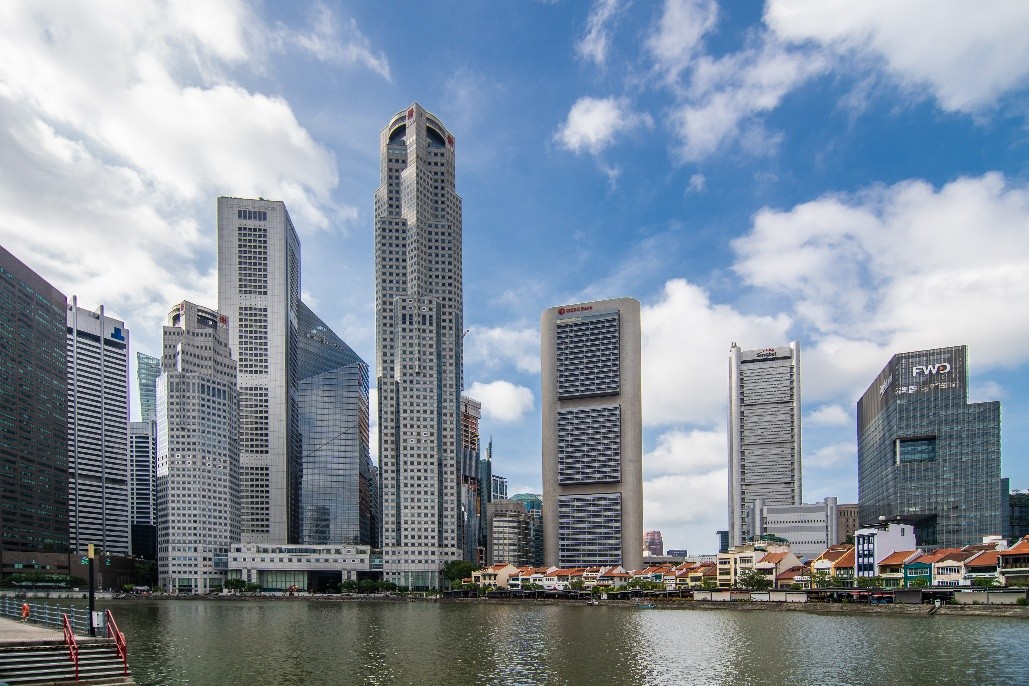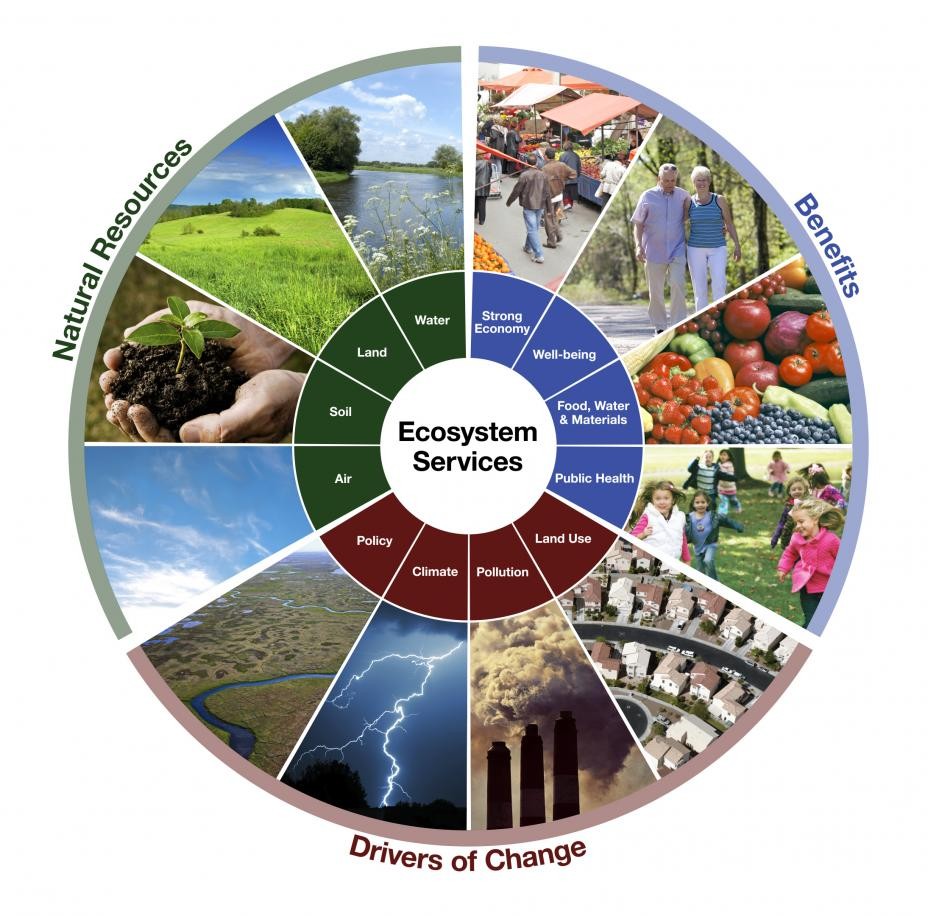
Urbanization
- Urbanization drives economic growth but also breaches planetary boundaries, erodes ecosystem services, and threatens food security and biodiversity.
- Businesses need to recognize their dependence on nature and actively manage ecosystems to mitigate risks and ensure long-term sustainability.
Urbanization is one of the defining forces of our century. For the first time in history, more than half the world’s population lives in cities and by 2050, that figure is expected to climb to nearly 70%. The scale of this shift brings both opportunities and risks. On the one hand, cities can be engines of economic growth, innovation, and cultural exchange. On the other hand, rapid and uneven urban growth has created challenges such as overcrowding, rising inequality, increased pressure on infrastructure, and the loss of ecosystem services.

Fig.1: Singapore Urbanization
One of the planetary boundaries that has already been breached is the land-system change boundary. With the increase in urbanization and the expansion of built-up areas, vast tracts of forests and wetlands have been cleared to make way for housing, infrastructure, and industry. Globally, it is estimated that more than 75% of the Earth’s ice-free land has already been significantly altered by human activities, and urban expansion continues to accelerate this trend. This not only reduces biodiversity but also disrupts ecosystems.

Fig.2: Ecosystem Services
The conversion of natural ecosystems into urban landscapes results in the erosion of vital ecosystem services, which are broadly categorized into four key areas: provisioning, supporting, regulating, and cultural. Intact ecosystems sustain biodiversity that delivers provisioning services, such as food and freshwater, supporting services, including photosynthesis and soil formation, regulating services, like pollination and climate regulation, and cultural services, including recreation and spiritual value. When urban development disrupts these ecosystems, these services are diminished or lost. Research estimates that the collapse of essential ecosystem services could cost the global economy USD 2.7 trillion annually by 2030. Nature and the services it provides form the foundation of our economies, yet companies often mindlessly exploit these resources for short-term financial gains at the expense of long-term sustainability.

Fig.3: Coffee Plantation
In Southeast Asia, one striking example is the decline of pollinators in Vietnam’s coffee sector, the world’s second-largest producer of coffee. Expanding urban areas and infrastructure projects have fragmented forests and reduced the habitats of wild bees, which play a crucial role in pollinating coffee plants. While most bee species are not critically endangered, their declining populations already limit coffee yields. Research has shown that coffee farms with poor pollinator activity can suffer yield losses of up to 20%, translating into significant income risks for farmers and export losses for national economies. The loss of this single provisioning service, pollination, also undermines supporting services such as genetic diversity which ensures ecosystem stability. For Vietnam and its neighbours, the financial stakes are high: coffee exports contribute billions of dollars annually, meaning that the degradation of ecosystem services from urbanization is not just an environmental concern, but a major economic one. From growers to global brands, companies across the coffee value chain are feeling the heat as supplies shrink and prices climb. As for consumers, the daily cup of coffee that fuels mornings worldwide, could become more of a luxury than a habit.
Unlike many countries where rapid urbanization has led to unchecked biodiversity loss and heightened climate risks, Singapore has taken deliberate steps to evolve into a “City in Nature.” This vision helps ensure that Singapore does not become a “concrete jungle”, where reduced ground porosity results in increase surface runoff and more frequent flooding events. In contrast, many cities have already lost these vital ecosystem services. For example, in Jakarta, Indonesia, approximately 97% of wetlands have been converted into built-up areas, severely reducing the city’s ability to buffer against environmental hazards. The resulting floods disrupt daily life, business operations, and workforce productivity, ultimately driving up costs. For companies, this highlights the importance of mindful land use and stewardship of ecosystem services. Protecting these services is not only an environmental responsibility but also a safeguard for long-term economic resilience and corporate financial stability.
As investors, we value companies that understand their business reliance on ecosystem services, actively manage them, and implement plans to operate within environmental limits. By embedding sustainability into their strategies and aligning operations with planetary boundaries, companies can reduce risks, protect the environment, and build long-term resilience. We are committed to partnering with organizations that embrace this path of continuous value creation and responsible stewardship
The Blueprint
With the ever-changing landscape around us, it can get overwhelming to stay up-to-date. The Blueprint highlights pertinent global Environmental, Social, and Governance (ESG) issues and their importance to investors and the wider community. We look forward to engaging in discussions about the interconnections between climate, nature, and social outcomes that impact our investments and our futures.
Important Information
This material is provided by Phillip Capital Management (S) Ltd (“PCM”) for general information only and does not constitute a recommendation, an offer to sell, or a solicitation of any offer to invest in any of the exchange-traded fund (“ETF”) or the unit trust (“Products”) mentioned herein. It does not have any regard to your specific investment objectives, financial situation and any of your particular needs.
The information provided herein may be obtained or compiled from public and/or third party sources that PCM has no reason to believe are unreliable. Any opinion or view herein is an expression of belief of the individual author or the indicated source (as applicable) only. PCM makes no representation or warranty that such information is accurate, complete, verified or should be relied upon as such. The information does not constitute, and should not be used as a substitute for tax, legal or investment advice.
The information herein are not for any person in any jurisdiction or country where such distribution or availability for use would contravene any applicable law or regulation or would subject PCM to any registration or licensing requirement in such jurisdiction or country. The Products is not offered to U.S. Persons. PhillipCapital Group of Companies, including PCM, their affiliates and/or their officers, directors and/or employees may own or have positions in the Products. This advertisement has not been reviewed by the Monetary Authority of Singapore.
